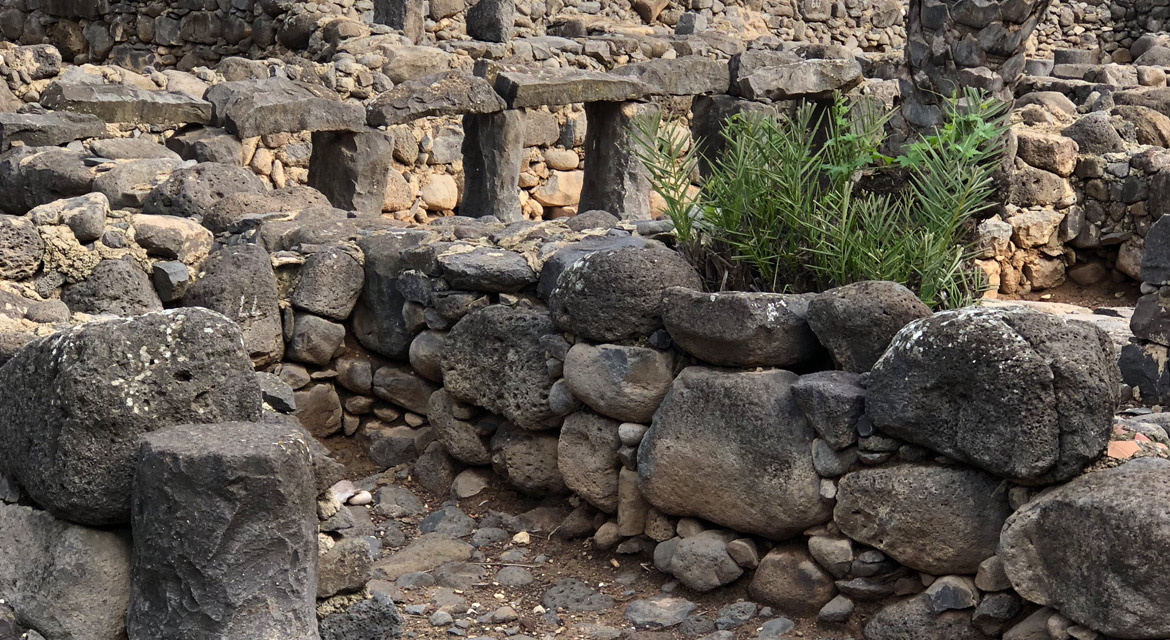Dust from Another Land
Luann Lewis
Essay
They all come to the Jordan River to be baptized. Young and old, big and small, folks from everywhere. With the sign of the cross, some enter the water with reverence, others whoop and raise arms. Some sing with joy or smile, faces raised to the sun.
Although it is cold outside, many from our group don the thin white robes offered and trek gingerly down the wide stone steps to the water’s edge. The Pastor and his son (also our pastor), somehow comfortable in the unsympathetic stream, beckon each person in turn, ask them the faith questions then gently (but rapidly) dunk them. Each rise, soaked, triumphant and joyful. Each is a new person, made whole in the polar plunge.
I don’t do it.
The bitter slice of frigid water against my skin is not an experience I need to take home from Israel, but my decision to pass up this once-in-a-lifetime opportunity is cemented when I look at this designated patch of water they have roped off.
Day after day joyful bodies from around the globe gather to be submerged. For how many decades has that gone on? How many centuries? All in this very place where they believe Jesus was baptized.
Dust from Another Land
Israel’s National Water Carrier Project uses the Sea of Galilee as a reservoir, and Jordan’s East Ghor project diverts water from the Yarmuk River. Other irrigation projects, in Syria and Lebanon, divert water from the Jordan’s headstreams. This extensive use of the river and its tributaries for irrigation has depleted the flow into the Dead Sea and greatly increased pollution in the Jordan.
Ha! I think. I bet I know what else has greatly increased pollution in the Jordan.
How irreverent of me! How unspiritual! I’m probably going to get struck by lightning! But I can’t help gazing into the murky brown liquid swirling around my husband as he is pushed beneath the surface. Shuddering, I don’t feel his joy. I only look forward to him showering later tonight.
Yes, John the Baptist stood in this water. Jesus strolled into it. A dove appeared from Heaven and God spoke. But that’s not happening here. That’s not gonna happen here. There’s a line of white-clad people, groups with their churches or tours, all sorts of languages, all shapes, sizes and types. Each dipping in the muddy brown of the Jordan. Each dipping in the roped-off section of the Jordan where there is very little current. Each dipping where so many have dipped, starting even before Jesus dipped beneath that water. Each one shedding skin, bacteria, hair follicles, dandruff, and their own sludge on top of the sludge of the devout before them.
They all come to the Jordan River to be baptized. But I guess I’m the only one who thinks about them dipping in a big human soup—a big soup all together.
Still, this soup, disgusting and bacteria-filled, is the soup that Jesus chose to become a part of. He was right in the middle of it.
As for me, well, I’m not going in there.

Nobody knows for sure (just like so many sites in Israel) but this—where I stand—could be the tomb where Jesus lay. Cut into a hillside, it is empty and cold, dim and damp, it is useless now that Jesus is gone.
And a church—a glorious church—built on another spot they call his tomb, hides a different empty and useless cave, similar to this one, buried and hollow, devoid of Jesus. Like any grave hidden under fertile soil or under young spring grass or below drab broken rock or even lush embroidered velvet, it holds no Jesus. Empty is empty.
No matter how many processions are made, no matter how many songs of worship are sung, no matter how many sorrowful tears are shed, or prayers are repeated, or photos are taken, or crucifixes are sold, or floors are kissed, or scarves are hawked. Where there is no Jesus there is emptiness.
The Garden Tomb in Jerusalem has meaning because Jesus was once there. It has meaning because the stone was rolled away. It has meaning because of its emptiness. It has meaning because he rose. The Garden Tomb in my own soul has meaning for the opposite reason. It has meaning because Jesus moved the immovable and continues to fill the unfillable.

Jesus walked here. I keep telling myself during this trip to Israel. Jesus walked here.
Well, not on this exact dust. Centuries of ground up rocks, sandals, leather wrapped moccasins, slip-ons, boots, heels, sneakers, and more all walked here after that. Each leaves its own mark, as do the dogs and donkeys, cats and camels, and wind-blown sand from surrounding desert land. But buried under several feet of history is ground where Jesus trod, his holy feet leaving their own mark. Feet that would be massaged with scented oil and tears.
So beloved was he that a kneeling woman cried with gratitude and used her hair to soothe his feet – feet that had wandered in the wilderness for forty days as he fought temptation. Feet that had skimmed the surface of the Sea of Galilee as he walked out to meet his disciples. Feet that would be pierced by thick iron nails and drip hot blood. And, feet that would set themselves back onto the cold hard stone of his tomb and step out into the warm radiance of the rising sun.
Jesus walked here, where I’m standing.
It doesn’t seem real to me. I expect an electrical charge, an instant healing (though I’m not sick). I expect a revival of the heart.
Surrounded by a thousand strangers and some new friends, I listen to our guide, the guy with the fast stride and the microphone, while he explains how it was all built, who took it over, the tribes that assumed it. But I just keep imagining Jesus walking here and I try to absorb what I’m hearing.
I carry it home with me—past TSA, right through Customs, onto the plane, through the door to my house and into my every day life. I carry it inside me, even now, that dust from another land.

Luann Lewis is a Chicago legal writer who in semi-retirement is pursuing an MFA. A writer of fiction, flash, and poetry, she has had pieces featured in a number of online and print magazines as well as had a story performed by Manawaker Studios Podcasts. Visit her site at https://frommindtopen.weebly.com/
Image Credit: Luann Lewis


